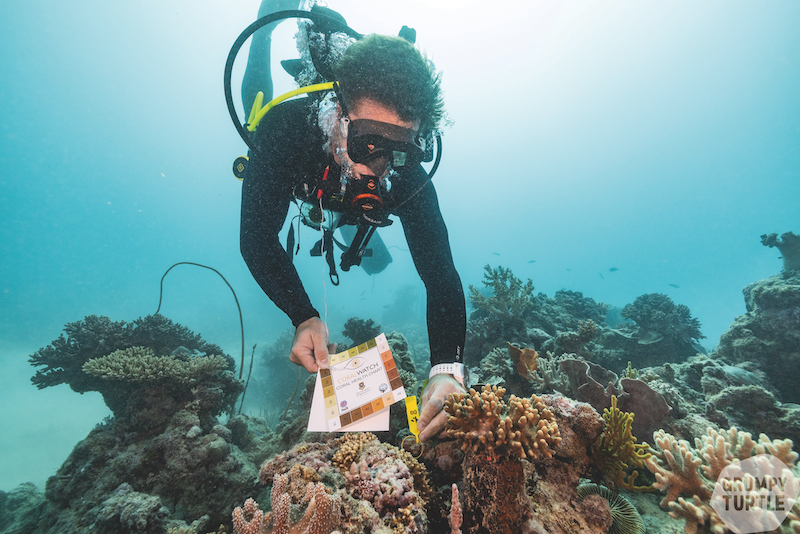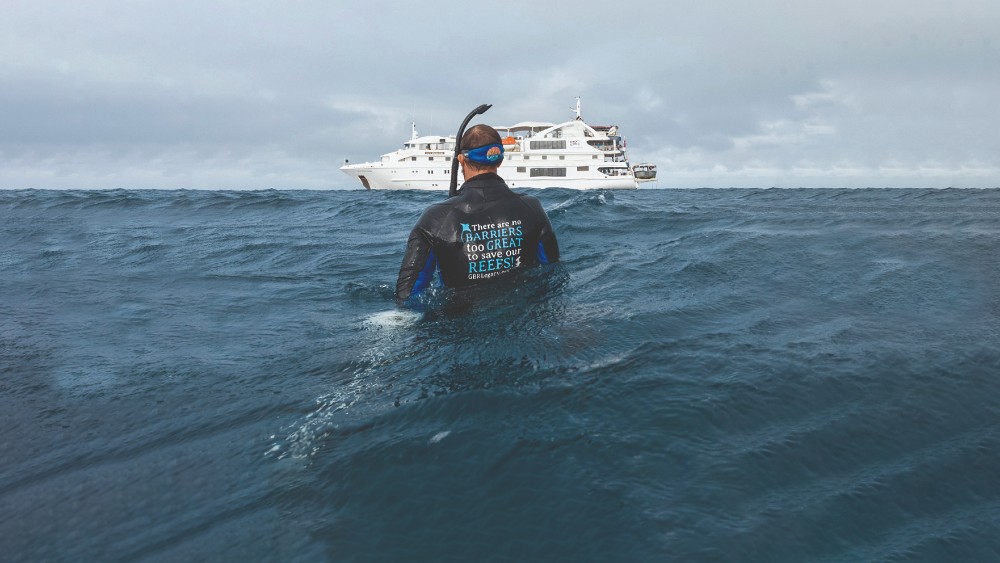Cruise ships with a science twist bring a fresh perspective to guest experiences.
A spoon, a bucket and a piece of rope may not seem like sophisticated scientific equipment, however working beside a scientist in Antarctica it’s a simple way to help reduce one of the biggest threats to the health of our waterways.
Collecting sand samples to test for microplastics is one of several opt-in projects Aurora Expeditions offer guests as part of their citizen science program.
“By involving guests in collecting data, it demystifies science,” says Dr John Kirkwood, marine biologist and coordinator of Aurora’s citizen science program.
Science is at the heart of Aurora Expeditions. Named in honour of Dr Sylvia Earle, marine biologist, oceanographer and explorer, their latest vessel, the Sylvia Earle, pays homage to female scientists with each deck dedicated to a pioneer of conservation and a stunning glass lounge sprawling over two-levels that incorporates a dedicated science lab designed to support scientist’s research and on-board projects.
Ponant is another company embracing science with its flagship luxury polar expedition vessel – Le Commandant Charcot decked out with an innovative research area featuring wet and dry labs, sonar, beacon-buoys, a salinometer, not to mention the ship’s drone.
“For us, putting our technical and human resources at the service of science to create opportunities for research is a logical extension to raising our guests’ awareness of issues related to protecting the planet,” says Hervé Gastinel, Ponant CEO
And like Aurora, guests onboard Le Commandant Charcot, can participate in a range of projects such as cloud surveys, studying sea ice, whale identification and phytoplankton sampling designed to provide data to organisations like NASA or individual research scientists.
In other fragile parts of the world, scientific focused expeditions also assist in research as well as enriching guest experiences.
Warmer waters
Rules surrounding any vessel sailing in the Galapagos Islands, let alone a new one, are thankfully stringent. So, since Celebrity Cruises launched their game-changing Celebrity Flora a couple of years ago, it’s continued to send a buzz through expedition cruising circles.
In addition to being the most ‘energy efficient’ vessel of its kind cruising the islands, the 100-guest luxury-meets-nature-head-on floating masterpiece is also the first in the region to house oceanographic research equipment known as ‘Oceanscope’. With the capability to measure sea-surface temperatures this cutting-edge technology can help scientists make predictions of weather patterns such as El Niño and La Niña.
As a totally unique destination, life onboard Celebrity Flora revolves around the environment. From presentations and activities led by marine scientists, to ‘glamping’ outside under the stars (a first for Galapagos), guests are immersed in thought-provoking experiences.
Small intimate environment-focused cruises are also a signature of Coral Expeditions. For more than 35 years, this Australian company has stayed close to home and developed a niche market for curious minds.
“In recent years, we have seen a desire from more guests to be involved in travel experiences that are hands on in the participation elements of science and where a cause or a greater good is the outcome. In response, we developed, in partnership with the team at Australian Geographic and others, a ‘citizen science’ series of voyages.” says Jeff Gillies, Commercial Director, Coral Expeditions.
Scheduled for October 2023, the next citizen science voyage together with Australian Geographic will ‘combine environmental impact with an expedition holiday’ to explore the outer reefs of the Great Barrier Reef.
Limited to 66 guests and researchers, it’s an opportunity for people to work beside scientists on projects like helping log species of marine creatures and conservation of sea turtles at a rehab centre on Fitzroy Island.
Aquatic to astronomic
The science of the night sky holds a fascination to many people, and over the past few years there has been a concentration of cruise lines coordinating itineraries to enable guests to jag a view of the aurora borealis – those dancing lights that dazzle the skies deep in the northern hemisphere.
Quark Expeditions offers a wonderful ‘under the northern lights’ cruise each September taking in Iceland and East Greenland; Cunard sails ex Southampton to explore the picture-perfect Norwegian coastline on their ‘Norway and northern lights’ 12-day voyage, and Aurora Expeditions has a jewel in the crown, 22-day ‘northern lights explorer’ itinerary during September each year covering the Norwegian coastline as well as East Greenland, Iceland and even the Faroe Islands – all possible northern lights hotspots.
When it comes to a phenomenon like a solar eclipse, advance planning to position a ship in the perfect spot takes ingenuity. In April 2023, a hybrid eclipse, the rarest of all eclipses will occur and be visible in Australia for the first time in almost 1000 years.
Partnering with the Astronomical Society of Australia, P&O’s five night, ‘Ningaloo king of the eclipse cruise’ will give seasoned or novice ‘umbraphiles’ (people who love eclipses), the best possible chance to experience this incredible moment in time and be immersed in stories and presentations surrounding the eclipse.
Coral Expeditions also have a special 13-night solar eclipse expedition, departing from Darwin and sailing along the top end of the Western Australian coast and out to the gloriously remote Australian Territory of Ashmore and Cartier islands. Guest presenters from the Australian Geographic Society, Professor Fred Watson AM, a pioneer of the use of fibre optics in astronomy and Marnie Ogg, founder of Australia’s Dark Sky Alliance will bring another dimension to the what will be an incredible expedition.
The sky really is the limit when it comes to science-based cruising.








